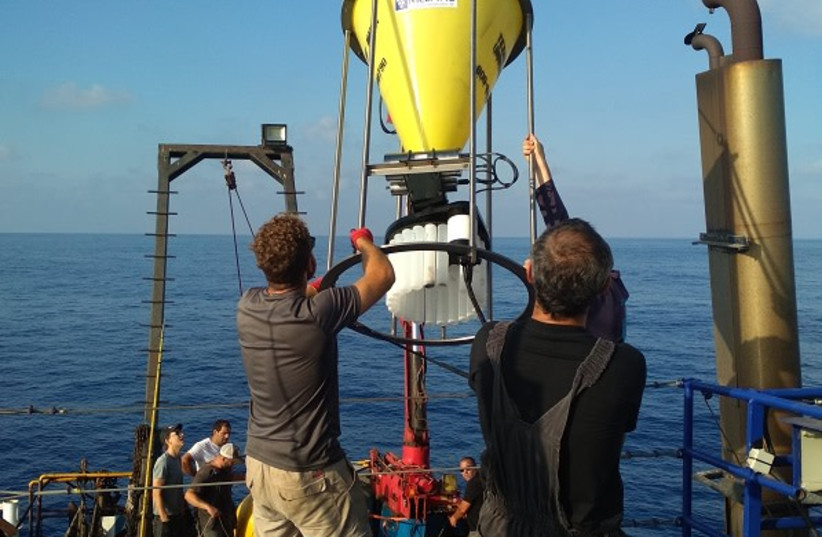“The oceans are a crucial part of our world,” says Prof. Ilana Berman-Frank, Director of the Leon H. Charney School of Marine Sciences at the University of Haifa. “We know much less about the oceans than we do about space, and the oceans provide all the essential things we need.” The University of Haifa’s School of Marine Science is the top-ranked marine program in Israel, where curious, inquisitive, and independent-minded students from around the world study with the top professors in the field in the school’s three Marine Science Departments. Currently, 260 graduate students and post-doctoral students are enrolled in the International, English-language program.
Students in the Dr. Moses Strauss Department of Marine Geosciences combine research and graduate studies in geology, geophysics of the seafloor and subterranean areas, climate changes, the stability of the seafloor and the coastal zone, tsunamis and desalination. Professor Berman-Frank explains that this research can yield numerous practical benefits, including finding reservoirs of gas and oil, ensuring the stability of the seafloor, which is vital for coastal zones and for installing platforms for oil and gas rigs, as well as researching ancient tsunamis to gain a greater understanding of where tsunamis will strike in the future.
The University of Haifa’s Marine Biology department studies the living organisms that inhabit the seas, from the smallest organisms to the largest marine mammals. Students research jellyfish development, whale communication, and the ecology of the biological food web in different marine systems around the world.
The newest marine department at the University of Haifa is Marine Technologies, where technology is used to develop knowledge, novel methods and advanced equipment for applied research of the sea. “It’s amazing stuff,” exclaims Professor Berman-Frank. “It’s acoustics and communication, underwater navigation, computerized sight and optics, which set up the platforms that we can use for doing really good science.”

Professor Berman-Frank explains that the School of Marine Sciences’ graduate programs fully align with the United Nations Sustainable Development Goals (SDG) that the university has adopted. Among the Sustainable Development Goals are the elimination of poverty and hunger, providing affordable and clean energy, and developing industry, innovation and infrastructure. “Terrestrial food production will decline,” she says, “and we are expecting to increase food from the sea – not just raising fish – but many other products will come from the sea to provide proteins, natural products, medicines and cosmetics.” In this way, the Marine Science graduate programs can contribute to the elimination of poverty and energy. She adds that providing energy from the sea and innovative ‘blue technology’ – industry related to the aquatic environment – meet the SDG goals of affordable energy and innovation.
Students from countries in Africa, Asia, China, India, Europe and the United States attend the International graduate programs in Marine Sciences at the University of Haifa. “Some choose to attend because of specific faculty members, and others see opportunities for a comprehensive program in marine sciences.” Students from the different Marine departments study and work together and are exposed to other issues of Marine science.
Sharon Liper, Head of School Administration at the School of Marine Sciences, notes that graduates of the International Master’s program in Marine Sciences find employment in a variety of different fields. “Some marine biology graduates go into biotech industries and blue-technology industries,” she says. Others continue their education in doctoral programs at the University of Haifa or other prestigious institutions around the world. Many Marine science graduates work in environmental NGO’s, environmental consulting, gas and other marine resource industries, or government offices, while others become heads of laboratories, technicians, or engineers. She adds that the school assists in the development of applied research and connections to industry, helping to provide practical solutions to real-life problems.
Perhaps Prashant Tewari, a graduate student from India, puts it best. “The Charney School of Marine Sciences at the University of Haifa is world-renowned for its cutting-edge research. In my master’s program, I get to study something new every day, which I find fascinating. I’m transitioning from a naive undergraduate student to a confident master’s student, and the training I’m receiving here will help me become a better researcher in the future.”
Visit the school’s Virtual Open House on March 1 and March 2 to learn more!
This article was written in cooperation with the University of Haifa
